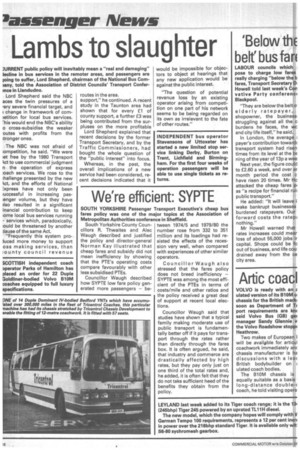We're efficient: SYPTE
Page 10

If you've noticed an error in this article please click here to report it so we can fix it.
SOUTH YORKSHIRE Passenger Transport Executive's cheap bus fares policy was one of the major topics at the Association of Metropolitan Authorities conference in Sheffield.
South Yorkshire County Councillors R. Thwaites and Alec Waugh described and justified the policy and director-general Norman Kay illustrated that cheap fares and subsidy did not mean inefficiency by showing that the PTE's operating costs compare favourably with other less subsidised PTEs.
Councillor Waugh described how SYPTE low fare policy genbe erated more passengers tween 1974/5 and 1979/80 the number rose from 332 to 351 million and its loadings had resisted the effects of the recession very well, when compared with experiences of other similar operators.
Councillor Waugh also stressed that the fares policy does not breed inefficiency — SYPTE was among the most efficient of the PTEs in terms of costs/mile and other ratios and the policy received a great deal of support at recent local elections.
Councillor Waugh said that studies have shown that a typical family making moderate use of public transport is fundamentally better off if it pays for transport through the rates rather than directly through the fares box. It is often argued, he said, that industry and commerce are drastically affected by high rates, but they pay only just on one third of the total rates and, he added, it is often felt that they do not take sufficient heed of the benefits they obtain from the policy.














































